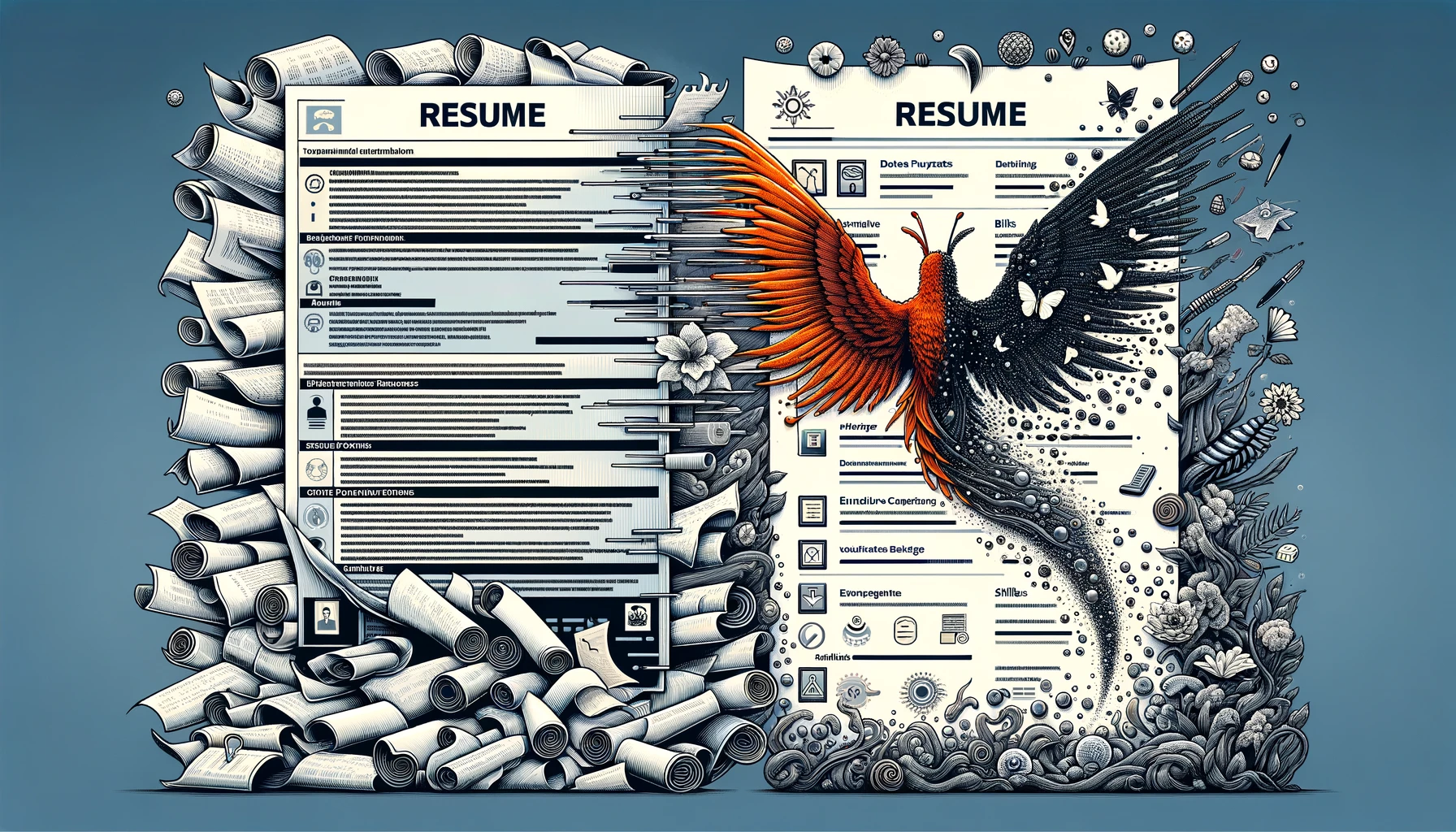Resumes are the unsung heroes of the job application process, silently speaking on behalf of applicants before they even step foot into an interview room. In a competitive landscape where first impressions can truly make or break one’s chances, the power of a well-crafted resume cannot be overstated.
It serves as a meticulously curated snapshot of your professional journey, not only showcasing your experiences and skills but also offering a glimpse into your personality and potential fit for the role you desire.
However, amidst the meticulous content structuring and impressive vocabulary choices lies a subtle yet potent pitfall that haunts many resumes—an Achilles’ heel that could potentially overshadow all your qualifications with just one glaring misstep.
Imagine pouring hours into perfecting every section, finetuning each bullet point for maximum impact, only to unknowingly introduce this fatal flaw that recruiters spot in an instant. It’s like preparing an exquisite meal only to realize you’ve overlooked the key ingredient essential for its success.
The repercussions? Missed opportunities, dashed hopes, and silent rejections without feedback. But fear not; in this article, we delve deep into uncovering this elusive mistake—one so common yet often unnoticed—and equip you with strategies to ensure your resume stands out for all the right reasons.
Are you ready to unveil what might be sabotaging your chances without you even realizing it? Join us on this revealing journey through resume writing essentials – where attention to detail is everything!
Identifying The Crucial Mistake
When it comes to crafting a compelling resume, the devil lies in the details. One of the most common pitfalls that job seekers often stumble into is using generic templates or cookie-cutter formats for their resumes.
While it may seem like a time-saving strategy, this approach can have detrimental effects on how recruiters perceive your application. Recruiters are inundated with countless resumes daily, and one that blends in with the rest fails to make a lasting impression.
Furthermore, relying on generic content not only diminishes your chances of standing out but also sends a signal to recruiters that you lack the effort or interest required for the specific role.
In an increasingly competitive job market where personalization is key, tailoring your resume to mirror the job requirements showcases your attention to detail and commitment to securing the position.
By addressing this fundamental mistake head-on and customizing your resume accordingly, you not only differentiate yourself from other applicants but also demonstrate a genuine interest in the opportunity at hand.
Consequences Of Making This Mistake
Picture this: You’ve spent hours crafting what you believe to be a stellar resume – your qualifications shine, your experiences speak volumes, and your skills are perfectly outlined.
But amidst the sea of words, there lies a subtle yet critical mistake that could render all your hard work futile. The consequence? Your resume may end up in the dreaded rejected pile before even getting a second glance.
Let’s delve into the real-life implications of this overlooked error. Imagine a hiring manager sifting through dozens of resumes for a sought-after position.
They come across yours, but alas, the mistake steals their attention away from your expertise. It could be as simple as failing to tailor your resume to match the job description or overlooking typos that signal carelessness – these seemingly minor missteps can cost you an opportunity to showcase why you’re the perfect fit for the role.
In today’s competitive job market, where every word matters and first impressions are everything, one slip-up can mean losing out on a chance that could have been yours with a polished and targeted resume.
Now consider how this mistake extends beyond just missing out on one job opportunity. It sets off a ripple effect that impacts not only your current search but potentially future endeavors too.
Recruiters remember patterns; if they spot inconsistencies or lack of attention to detail in one application, it raises doubts about your overall professionalism and commitment to excellence.
The consequences reverberate further than expected – tarnishing not just one document but possibly casting shadows on how potential employers perceive your entire professional persona.
Mastering the Art of Tailoring: Practical Tips for Resumé Success
Crafting a tailored resume is more than just plugging in keywords; it’s about showcasing your unique value proposition to each prospective employer.
Start by thoroughly researching the company and job role you’re applying for. Understand their values, culture, and specific requirements. This knowledge will empower you to customize your resumé effectively.
Next, dissect the job description like a seasoned detective. Highlight key skills, qualifications, and experiences that are prominently mentioned.
Mirror these details in your resumé by aligning your achievements with what the employer seeks. Remember, it’s not about reinventing yourself but presenting the best version of your professional self that resonates with their needs.
Furthermore, don’t underestimate the power of quantifiable results. Numbers speak volumes when it comes to showcasing your impact.
Whether it’s increased sales revenue by 30% or streamlined operational processes resulting in a 25% cost reduction, quantify your accomplishments to substantiate your claims.
This evidence-based approach adds credibility and sets you apart from other applicants who merely list responsibilities without demonstrating tangible outcomes.
Revamping Your Resume
To revamp your resume effectively and rectify the common mistake of generic content, start by tailoring your professional summary to align with the specific job requirements.
This section serves as a snapshot of who you are professionally and what value you bring to the table.
By customizing this summary to reflect key skills and experiences sought by the employer, you immediately capture their attention and demonstrate that you are a strong fit for the role.
Next, delve into your work experience with a critical eye towards relevance. Instead of listing duties or responsibilities in a generic manner, emphasize accomplishments and quantifiable achievements that showcase your impact in previous roles.
Numbers speak volumes on resumes, so consider including data points or results achieved to substantiate your contributions. Moreover, use active language and power verbs to convey confidence and drive within each bullet point, painting a vivid picture of your capabilities for potential employers.
Furthermore, don’t overlook the importance of keywords when revamping your resume. Many companies now utilize applicant tracking systems (ATS) to streamline their hiring processes by scanning resumes for specific terms related to the job description.
Incorporating relevant keywords from the job posting naturally throughout your document can significantly increase its chances of passing through ATS screenings and landing in front of human recruiters for further consideration. Remember: precision is key when optimizing your resume for both digital screening tools and human readers alike.
Crafting an impactful resume is a meticulous process that requires attention to the smallest details. The difference between a mediocre resume and one that captivates employers often lies in the fine points: grammar, formatting, and tailored content.
By summarizing your key achievements with precision and clarity, you present yourself as a professional who values thoroughness and excellence. These seemingly minor aspects can make a substantial impact on how your application is perceived.
Imagine your resume as the first impression you make on a potential employer – each comma misplaced or bullet point overlooked could be sending the wrong message about your professionalism and commitment to quality work.
Therefore, taking the time to spot typos, ensure consistency in formatting, and customize your content for each job application showcases not only your qualifications but also your dedication to presenting yourself in the best possible light.
Remember, in a competitive job market where every detail matters, overlooking these nuances might cost you that coveted interview opportunity. So next time you review your resume, remember that devil really is in the details!





